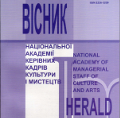СТРАТЕГІЧНІ ПРОБЛЕМИ КУЛЬТУРНОЇ ПОЛІТИКИ В ПОВОЄННІЙ УКРАЇНІ
STRATEGIC ISSUES OF CULTURAL POLICY IN POST-WAR UKRAINE
Author(s): Polina HerchanivskaSubject(s): Cultural history, Museology & Heritage Studies, ICT Information and Communications Technologies, Politics and Identity
Published by: Національна академія керівних кадрів культури і мистецтв
Keywords: cultural policy; identity crisis; memorial paradigm; cultural heritage; museification; digital technologies; visual culture;
Summary/Abstract: The purpose of the study is to analyse the role of the cultural sphere in the modernisation of Ukrainian society, as well as to identify strategic problems of cultural policy in post-war Ukraine and ways to solve them. Research methodology. The research methods are based on the fundamental principles of cultural analysis of Ukrainian society from the perspective of modern scientific concepts. The methodological core of the study is based on such scientific fields as phenomenology and hermeneutics to reveal the creative potential of Ukrainian culture. By means of a systemic analysis, the determinants of the identity crisis in Ukraine are investigated and strategic directions of cultural policy for its overcoming are defined. The scientific novelty is to identify the priorities of cultural policy for the effective reform of Ukrainian society by forming a new cultural code of the nation and a new Ukrainian identity that corresponds to the modern socio-cultural paradigm. Conclusions. The article emphasises the importance of enhancing the role of culture for the successful modernisation of Ukrainian society. To implement this project, it is necessary to reform the ideology of the state cultural policy with an emphasis on the development of the creative potential of the people and its consolidation. The strategic guidelines of cultural policy as a value-based foundation for reforms are defined. It is proved, firstly, that the tangible and intangible cultural heritage of the people is an important resource for the formation of a new identity of the nation, and the main mechanism of social development is the continuity of culture. Secondly, in order to create a sustainable cultural industry capable of competing at the national and international levels, it is necessary to focus on its innovative development and the introduction of digital and modern management technologies into the cultural sphere. It is substantiated that a key element of post-war cultural policy should also be the rehabilitation of people who have survived bombing, occupation, and forced migration.
Journal: Вісник Національної академії керівних кадрів культури і мистецтв
- Issue Year: 2023
- Issue No: 2
- Page Range: 3-8
- Page Count: 6
- Language: Ukrainian

